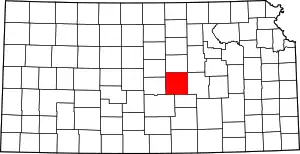Lindsborg, Kansas | |
|---|---|
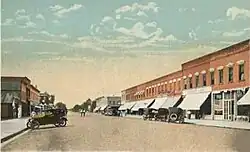 Lindsborg in the early 20th century | |
| Nickname: Little Sweden | |
 Location within McPherson County and Kansas | |
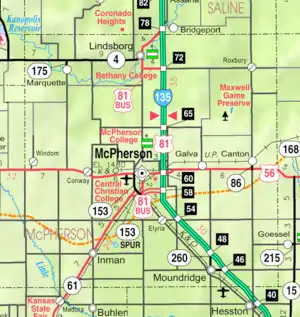 KDOT map of McPherson County (legend) | |
| Coordinates: 38°34′38″N 97°40′26″W / 38.57722°N 97.67389°W[1] | |
| Country | United States |
| State | Kansas |
| County | McPherson |
| Founded | 1869 |
| Incorporated | 1879 |
| Named for | Linden Castle |
| Area | |
| • Total | 1.85 sq mi (4.78 km2) |
| • Land | 1.83 sq mi (4.74 km2) |
| • Water | 0.02 sq mi (0.04 km2) |
| Elevation | 1,332 ft (406 m) |
| Population | |
| • Total | 3,776 |
| • Density | 2,000/sq mi (790/km2) |
| Time zone | UTC-6 (CST) |
| • Summer (DST) | UTC-5 (CDT) |
| ZIP code | 67456 |
| Area code | 785 |
| FIPS code | 20-41375 |
| GNIS ID | 485614[1] |
| Website | lindsborgcity.org |
Lindsborg is a city in McPherson County, Kansas, United States.[1] As of the 2020 census, its population was 3,776.[3] Lindsborg is known for its large Swedish, other Nordic and Scandinavian, and German heritages. It is home to the biennial Svensk Hyllningsfest.
History

For many millennia, the Great Plains of North America were inhabited by nomadic Native Americans. From the 16th to the 18th century, the Kingdom of France claimed ownership of large parts of North America. In 1762, after the French and Indian War, France secretly ceded New France to Spain, per the Treaty of Fontainebleau. In 1802, Spain returned most of the land to France. In 1803, the land for modern day Kansas was acquired by the United States from France for 2.83 cents per acre as part of the 828,000 square-mile Louisiana Purchase.
In 1854, the Kansas Territory was organized and in 1861 Kansas became the 34th U.S. state. McPherson County, which included the land for the future Lindsborg, was established in 1867. Lindsborg was settled in the spring of 1869 by a group of immigrants from the Värmland province of Sweden led by Pastor Olof Olsson. In 1879, the same year Lindsborg incorporated as a city, the first railroad came through.[4]
Lindsborg translates as Linden Castle from Swedish to English,[5] referring to a tree name known in Europe for a species of tilia (Swedish: lind). The community is named for four men whose surnames included "Lind", N. P. Linde, S. P. Lindgren, S. A. Lindell, and J. O. Lindh, who had held prominent positions in a Chicago organization of Swedish farmers (Svenska Lantbrukskompaniet or First Swedish Agricultural Company) which was involved in the settling of Lindsborg until 1877.[6][7]
Thirty percent of the current residents are of Swedish descent. Because the town has retained so much of the heritage of its founders, it has become known as "Little Sweden".[8] The downtown features gift shops that specialize in Swedish souvenirs, including various sizes of Dala horses. Lindsborg has long been noted for the Svensk Hyllningsfest, a biennial celebration held in October of odd-numbered years since 1941, and other efforts to honor its heritage.[9]
Lindsborg is the home of the Swedish Pavilion, which was originally constructed as an international exposition building for the 1904 St. Louis World's Fair. After the fair, it was purchased by W. W. Thomas, U.S. Minister to Sweden and Norway, and presented to Lindsborg's Bethany College as a memorial to his friend Dr. Rev. Carl Aaron Swensson, the school's recently deceased founder. At Bethany, it was used by the art department as a classroom, library, and museum. It was moved to the Lindsborg Old Mill & Swedish Heritage Museum, also in Lindsborg, in 1969.[10]
The Birger Sandzén Memorial Gallery is located in Lindsborg. Dedicated on October 20, 1957, on the Bethany College campus, it showcases the works of the artist Birger Sandzén who lived in the city. The gallery houses the largest and most extensive collection of his paintings, prints, and drawings found anywhere in the world.[11]
Swedish King Carl XVI Gustaf visited Lindsborg in April 1976 during his royal tour of the United States.[12]
In 2004, Lindsborg was named Chess City of the Year by the United States Chess Federation.[13]
Geography
According to the United States Census Bureau, the city has a total area of 1.69 square miles (4.38 km2), of which 1.67 square miles (4.33 km2) is land and 0.02 square miles (0.05 km2) is water.[14]
Climate
The climate in this area is characterized by hot, humid summers and generally mild to cool winters. According to the Köppen Climate Classification system, Lindsborg has a humid subtropical climate, abbreviated "Cfa" on climate maps.[15]
Demographics
| Census | Pop. | Note | %± |
|---|---|---|---|
| 1880 | 466 | — | |
| 1890 | 968 | 107.7% | |
| 1900 | 1,279 | 32.1% | |
| 1910 | 1,939 | 51.6% | |
| 1920 | 1,897 | −2.2% | |
| 1930 | 2,016 | 6.3% | |
| 1940 | 1,913 | −5.1% | |
| 1950 | 2,383 | 24.6% | |
| 1960 | 2,609 | 9.5% | |
| 1970 | 2,764 | 5.9% | |
| 1980 | 3,155 | 14.1% | |
| 1990 | 3,076 | −2.5% | |
| 2000 | 3,321 | 8.0% | |
| 2010 | 3,458 | 4.1% | |
| 2020 | 3,776 | 9.2% | |
| U.S. Decennial Census | |||
2020 census
The 2020 United States census counted 3,776 people, 1,346 households, and 838 families in Lindsborg.[16][17] The population density was 2,060.0 per square mile (795.4/km2). There were 1,469 housing units at an average density of 801.4 per square mile (309.4/km2).[17][18] The racial makeup was 87.76% (3,314) white or European American (86.28% non-Hispanic white), 2.6% (98) black or African-American, 0.34% (13) Native American or Alaska Native, 0.48% (18) Asian, 0.03% (1) Pacific Islander or Native Hawaiian, 3.2% (121) from other races, and 5.59% (211) from two or more races.[19] Hispanic or Latino of any race was 5.99% (226) of the population.[20]
Of the 1,346 households, 25.9% had children under the age of 18; 51.0% were married couples living together; 27.4% had a female householder with no spouse or partner present. 32.0% of households consisted of individuals and 16.3% had someone living alone who was 65 years of age or older.[17] The average household size was 2.2 and the average family size was 3.0.[21] The percent of those with a bachelor’s degree or higher was estimated to be 23.1% of the population.[22]
17.5% of the population was under the age of 18, 21.0% from 18 to 24, 18.0% from 25 to 44, 20.3% from 45 to 64, and 23.2% who were 65 years of age or older. The median age was 38.8 years. For every 100 females, there were 110.7 males.[17] For every 100 females ages 18 and older, there were 113.5 males.[17]
The 2016-2020 5-year American Community Survey estimates show that the median household income was $54,500 (with a margin of error of +/- $11,380) and the median family income was $76,055 (+/- $5,526).[23] Males had a median income of $36,912 (+/- $9,433) versus $24,500 (+/- $10,517) for females. The median income for those above 16 years old was $26,383 (+/- $2,680).[24] Approximately, 3.3% of families and 9.8% of the population were below the poverty line, including 5.9% of those under the age of 18 and 7.7% of those ages 65 or over.[25][26]
2010 census
As of the census[27] of 2010, there were 3,458 people, 1,303 households, and 829 families residing in the city. The population density was 2,070.7 inhabitants per square mile (799.5/km2). There were 1,414 housing units at an average density of 846.7 per square mile (326.9/km2). The racial makeup of the city was 94.8% White, 1.7% African American, 0.1% Native American, 0.5% Asian, 0.1% Pacific Islander, 0.8% from other races, and 2.1% from two or more races. Hispanic or Latino of any race were 3.5% of the population.
There were 1,303 households, of which 28.1% had children under the age of 18 living with them, 52.3% were married couples living together, 8.4% had a female householder with no husband present, 2.9% had a male householder with no wife present, and 36.4% were non-families. 31.1% of all households were made up of individuals, and 15.7% had someone living alone who was 65 years of age or older. The average household size was 2.31 and the average family size was 2.88.
The median age in the city was 37.8 years. 20.3% of residents were under the age of 18; 17.4% were between the ages of 18 and 24; 18.7% were from 25 to 44; 23.6% were from 45 to 64; and 19.9% were 65 years of age or older. The gender makeup of the city was 47.5% male and 52.5% female.
2000 census
As of the census[28] of 2000, there were 3,321 people, 1,227 households, and 775 families residing in the city. The population density was 2,155.5 inhabitants per square mile (832.2/km2). There were 1,331 housing units at an average density of 863.9 per square mile (333.6/km2). The racial makeup of the city was 97.05% White, 1.11% African American, 0.39% Native American, 0.30% Asian, 0.30% from other races, and 0.84% from two or more races. Hispanic or Latino of any race were 1.60% of the population. 36.0% were of Swedish, 22.3% German, 8.4% American, 6.4% English and 5.7% Irish ancestry according to Census 2000.[29][30]
There were 1,227 households, out of which 29.3% had children under the age of 18 living with them, 53.3% were married couples living together, 7.8% had a female householder with no husband present, and 36.8% were non-families. 33.8% of all households were made up of individuals, and 17.7% had someone living alone who was 65 years of age or older. The average household size was 2.26 and the average family size was 2.89.
In the city, the population was spread out, with 20.5% under the age of 18, 18.7% from 18 to 24, 21.0% from 25 to 44, 19.0% from 45 to 64, and 20.7% who were 65 years of age or older. The median age was 37 years. For every 100 females, there were 94.3 males. For every 100 females age 18 and over, there were 89.0 males.
The median income for a household in the city was $37,500, and the median income for a family was $46,250. Males had a median income of $32,500 versus $25,145 for females. The per capita income for the city was $17,415. About 4.9% of families and 8.2% of the population were below the poverty line, including 7.0% of those under age 18 and 9.7% of those age 65 or over.
Arts and culture
Area events
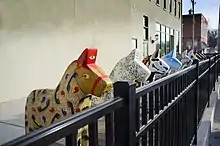
- Chocolate Lovers Affair & Art Auction is an annual February fundraiser in support of a vibrant arts community and graduates pursuing art.[31]
- Våffeldagen or Waffle Day is celebrated annually in March.[32]
- Messiah Festival of the Arts is a comprehensive arts festival concluding with a full-length performance of Handel's Messiah as established in 1881.[33]
- Lindsborg City-Wide Garage Sale is an annual yard sale in May for residents and visitors alike.
- Millfest is an annual festival on the first Saturday in May featuring historic sites, American folk music, woodcarving, wheat and fiber art weaving, and old fashioned games and activities.
- Midsummer annual summer solstice festival.
- Smoky Valley Classic Car Show
- Lindsborg Street Dance is an annual summer evening dance party featuring live music.
- Coronado Heights Run is an annual event in October featuring a kids fun walk, 5K, and 15K on scenic country-roads.[34]
- The Falun Classic Bike Ride is an annual 32-mile bicycle ride in October.
- Svensk Hyllningsfest is a biennial tribute to the Swedish pioneers occurring in October of odd-numbered years.
- Christmas in Lindsborg is a month-long series of events in December including the Snowflake Parade, Artist Open Studios, a St. Lucia Festival, Heritage Christmas, Julotta, and Annandag Jul among other entertainment and shopping events.
Area attractions

- Birger Sandzén Memorial Gallery
- Red Barn Studio Museum[35]
- Clara Hatton Center (Art museum and event space)[36]
- Smoky Valley Arts and Folk Life Center[37]
- Coronado Heights
- Smoky Valley Roller Mill
- Broadway RFD (Kansas's longest-running outdoor theater, established in 1959)
- International Chess Institute of the Midwest, formerly known as the Anatoly Karpov International School of Chess.[38]
- Swedish Pavilion historic site
- Historic Homes Tour[39]
Education

Primary and secondary education
The community is served by Smoky Valley USD 400 public school district.[40][41] Lindsborg is the home of:
- Smoky Valley High School
- Smoky Valley Middle School
- Soderstrom Elementary
College
Other
- The International Chess School of the Midwest, formerly called the Anatoly Karpov International School of Chess, is located downtown.[42][43]
Transportation
K-4 highway passes through Lindsborg. Bus service is provided daily towards Wichita and Salina by BeeLine Express (subcontractor of Greyhound Lines).[44][45]
Notable people
- Jay Emler, former Kansas Senate majority leader from 2011 to 2014, former District 35 senator from 2001 to 2014, was previously a Lindsborg municipal judge[46]
- Ted Kessinger, retired college football coach, member College Football Hall of Fame[47]
- Ebba Nylander, violinist and conductor born in Lindsborg
- John W. Peterson, Gospel songwriter born in Lindsborg
- Birger Sandzén, Swedish-born painter and teacher
Gallery
- Historic Images of Lindsborg, Special Photo Collections at Wichita State University Library
- Photo from 1961 Svensk Hyllnings Fest
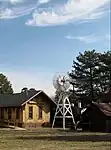 Old Lindsborg railroad station, located in Heritage Square in Lindsborg.
Old Lindsborg railroad station, located in Heritage Square in Lindsborg.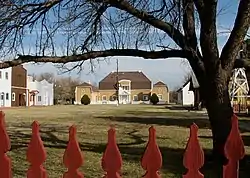 Swedish Pavilion from 1904 Saint Louis World's Fair, 2009
Swedish Pavilion from 1904 Saint Louis World's Fair, 2009 Fremont Lutheran Church (built 1870) near Lindsborg
Fremont Lutheran Church (built 1870) near Lindsborg Höglund Dugout, originally the home of the Gustaf and Maria Höglund family, where they lived while constructing their larger home and homestead. 12th Avenue off Wells Fargo Road one mile from Lindsborg
Höglund Dugout, originally the home of the Gustaf and Maria Höglund family, where they lived while constructing their larger home and homestead. 12th Avenue off Wells Fargo Road one mile from Lindsborg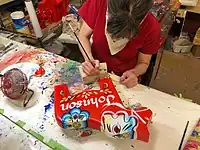 The Hemslöjd specializes in imported Swedish goods and brightly colored Dala horses that are made in house.
The Hemslöjd specializes in imported Swedish goods and brightly colored Dala horses that are made in house.
See also
- National Register of Historic Places listings in McPherson County, Kansas
- Berquist & Nelson Drugstore Building (1880)
- Clareen-Peterson Restaurant Building (1899)
- Farmers State Bank (1887)
- Holmberg and Johnson Blacksmith Shop (1900)
- Johnson House (1887)
- Smoky Valley Roller Mill (1898)
- Swedish Pavilion (1904)
- Teichgraeber-Runbeck House (1906)
- Lindsborg United States Post Office (1938)
- National Register of Historic Places listings in Saline County, Kansas
- Coronado Heights (1936)
References
- 1 2 3 4 U.S. Geological Survey Geographic Names Information System: Lindsborg, Kansas
- ↑ "2019 U.S. Gazetteer Files". United States Census Bureau. Retrieved July 24, 2020.
- 1 2 "Profile of Lindsborg, Kansas in 2020". United States Census Bureau. Archived from the original on November 12, 2021. Retrieved November 12, 2021.
- ↑ Blackmar, Frank Wilson (1912). Kansas: A Cyclopedia of State History, Volume 2. Standard Publishing Company. pp. 165.
- ↑ Engelsk-svenska ordboken ISBN 91-24-34422-2 pp 211 & 44
- ↑ Prins Wilhelm in Amerika från estraden, Norstedts, Stockholm, 1928, pp 183 & 195.
- ↑ Lindquist, Emory (1970). Vision for a Valley: Olof Olsson and the Early History of Lindsborg. Augustana Historical Society. p. viii.
- ↑ Little Sweden on the Prairie (The Local Europe AB)
- ↑ The Origins of the Festival (Svensk Hyllningsfest)
- ↑ Carl Aaron Swensson Archived 2012-06-26 at the Wayback Machine
- ↑ "Its History (Birger Sandzén Memorial Gallery)". Archived from the original on May 14, 2011. Retrieved September 22, 2010.
- ↑ "Cold-ridden king gets warm welcome". The Salina Journal. Salina, Kansas. April 18, 1976. p. 1. Retrieved October 7, 2017 – via Newspapers.com.
- ↑ "Anatoly Karpov International School of Chess". www.anatolykarpovchessschool.org. Retrieved September 19, 2021.
- ↑ "US Gazetteer files 2010". United States Census Bureau. Archived from the original on July 2, 2012. Retrieved July 6, 2012.
- ↑ Climate Summary for Lindsborg, Kansas
- ↑ "US Census Bureau, Table P16: HOUSEHOLD TYPE". data.census.gov. Retrieved January 3, 2024.
- 1 2 3 4 5 "US Census Bureau, Table DP1: PROFILE OF GENERAL POPULATION AND HOUSING CHARACTERISTICS". data.census.gov. Retrieved January 3, 2024.
- ↑ Bureau, US Census. "Gazetteer Files". Census.gov. Retrieved December 30, 2023.
- ↑ "US Census Bureau, Table P1: RACE". data.census.gov. Retrieved January 3, 2024.
- ↑ "US Census Bureau, Table P2: HISPANIC OR LATINO, AND NOT HISPANIC OR LATINO BY RACE". data.census.gov. Retrieved January 3, 2024.
- ↑ "US Census Bureau, Table S1101: HOUSEHOLDS AND FAMILIES". data.census.gov. Retrieved January 3, 2024.
- ↑ "US Census Bureau, Table S1501: EDUCATIONAL ATTAINMENT". data.census.gov. Retrieved January 3, 2024.
- ↑ "US Census Bureau, Table S1903: MEDIAN INCOME IN THE PAST 12 MONTHS (IN 2020 INFLATION-ADJUSTED DOLLARS)". data.census.gov. Retrieved January 3, 2024.
- ↑ "US Census Bureau, Table S2001: EARNINGS IN THE PAST 12 MONTHS (IN 2020 INFLATION-ADJUSTED DOLLARS)". data.census.gov. Retrieved January 3, 2024.
- ↑ "US Census Bureau, Table S1701: POVERTY STATUS IN THE PAST 12 MONTHS". data.census.gov. Retrieved January 3, 2024.
- ↑ "US Census Bureau, Table S1702: POVERTY STATUS IN THE PAST 12 MONTHS OF FAMILIES". data.census.gov. Retrieved January 3, 2024.
- ↑ "U.S. Census website". United States Census Bureau. Retrieved July 6, 2012.
- ↑ "U.S. Census website". United States Census Bureau. Retrieved January 31, 2008.
- ↑ U.S. Census Bureau - 2000 Census, Population and Housing Unit Counts for Kansas
- ↑ U.S. Census Bureau - 1990 Census, Population and Housing Unit Counts for Kansas
- ↑ "Learn more about L.A.C…". November 25, 2019.
- ↑ "Lindsborg Kansas Convention & Visitor Bureau - Våffeldagen (International Waffle Day)".
- ↑ https://www.messiahfestival.org
- ↑ "Lindsborg Kansas Convention & Visitor Bureau - Coronado Heights Run".
- ↑ https://www.redbarnstudio.org
- ↑ https://www.clarahatton.art
- ↑ https://smokyvalleyartsandfolklifecenter.org
- ↑ "Anatoly Karpov International School of Chess".
- ↑ https://www.visitlindsborg.com/media/where_did_they_live_2015_print.pdf
- ↑ USD 400
- ↑ Kansas School District Boundary Map Archived 2011-07-21 at the Wayback Machine
- ↑ May 2006 National Geographic Magazine
- ↑ International School of Chess of the Midwest distances itself from Karpov on its Facebook page
- ↑ BeeLine Express
- ↑ "Greyhound Lines". Archived from the original on September 6, 2019. Retrieved January 3, 2016.
- ↑ "Biography for Jay Emler – Kansas Senate majority leader". Retrieved March 4, 2013.
- ↑ "College Football". ESPN. May 11, 2010.
Further reading
- Wheeler, Wayne Leland. "An Analysis of Social Change in a Swedish-Immigrant Community: The Case of Lindsborg, Kansas." (PhD dissertation, University of Missouri-Columbia; ProQuest Dissertations Publishing, 1959. 5905657).
- The Americanization of a Swedish Colony in Kansas; Julius Lundstrom; 1972.
- Northern McPherson County Centennial Observance; Marie E. Malm; Lindsborg News-Record, 1970.
- The Smoky Valley in the After Years; Ruth B. Billdt; Lindsborg News-Record, 1969.
- Smoky Valley People: A History of Lindsborg, Kansas; Emory K. Lindquist, 1953.
- Swedish Day in Lindsborg; Mrs. Carl Peterson; Enterprise Journal; May 26, 1938.
- Lindsborg, Kansas: Fragments of History by the City Schools; Lindsborg City Schools; 1927.
External links
- City
- Lindsborg - Official
- Lindsborg - Directory of Public Officials, League of Kansas Municipalities
- Lindsborg Convention & Visitors Bureau
- Historical
- Maps
- Lindsborg city map, KDOT
